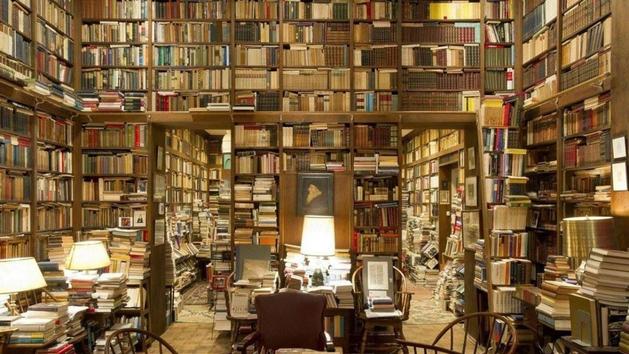Julia de Funès is a philosopher. She recently published Personal (imp) development: the success of an imposture (Observatory ed., 2019).
Whether the speaker is a doctor, actor, dancer, singer, politician, everyone films in front of ... a library. The usage status, the storage object that this piece of furniture is, has been changed to that of wallpaper. The office furniture has become decoration. Intellectualism, yet devalued in our ideologically egalitarian country, is suddenly displayed shamelessly. To believe that the biblioposers forget that in France (a country which nevertheless defends amalgams) the intellectual is quickly assimilated to the bourgeois, looking down on the proletarian anchored in reality, feet on the solid ground of common sense and not of good words. Some actors, singers, politicians, so demagogically "close to the people" in ordinary times, and so clever during a library interview, appear strangely uninhibited at the idea of belonging to the top of the (social) class. The current epidemic period, particularly attached to knowledge, science, scientists, researchers undoubtedly allows them to approach it. It is a temporary victory of the spirit, of the idea, of literary distinction, a small tackle from PSG-des-près on rurality.
The library protects from outside disorder and bad interior taste.But of what intentions is this decoration the sign?
Like the comforting presence of a parent, this piece of furniture bearing authority and memory, a sign of cultural maturity, reassures in the event that stupidity is uttered: "I can ramble on cretineries, I'm still cultivated, look behind me " warns the image. Alibi in the event of ignorance, cover in the event of idiocy, this piece of furniture also protects from outside disorder and bad interior taste. Its beauty does not depend on the aesthetic sense of its owner. Books are beautiful objects of always, unlike ornamental trinkets or decorative fancies that can always betray the lack of fatal taste. Two styles of libraries stand out, however. On the one hand, the library confined to the cadaverous complexion, of which only the filmed interview seems to provide a semblance of posthumous life. The pleasure of touch has long gone out, the traditional warm and soft wood gives way to clinical white melamine, straight and stiff. The books end their lives there definitively arranged like the white crosses of a military cemetery. On the other, the unconfined style, with an unmasked overflow, with affected works, piled up, but still alive. Orderly or disorderly, the library remains this space for storage, control, of what we can act on: ideas and representations, as opposed to the unpredictable and disorderly fatality of the facts that escape us.
Overseas the terrestrial foods prevail over the spiritual foods.If we pose in front of our library as we pose in front of a monument, it is also because it is a patriotic sign. In Asia you don't film interiors, privacy seems to be outlawed, people testify to the street and masked. In the United States, citizens appear not in front of old cognitive arsenals like ours, but in the midst of kitchen utensils, cookies, pancakes, signs of the victory of utility, necessity, vital, of need. To believe that across the Atlantic terrestrial foods prevail over spiritual foods, nature over culture, materiality over cerebrality, the ephemeral over the eternal. The kitchen symbolizes common domestic life, in other words the triumph of American democratic egalitarianism.
We are no longer a country that reads but seeks to show that it has read.Book images have distinguished our country. While reading is not the best shared thing in France, the library has become one! The container replaced the content, we talk less about books than books do about us. We are no longer a homeland which reads but which seeks to show that it has read. Should we see the swan song of our literary heritage?

